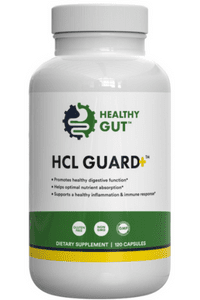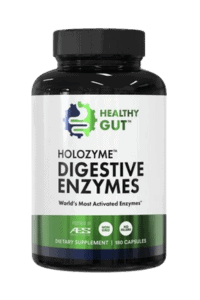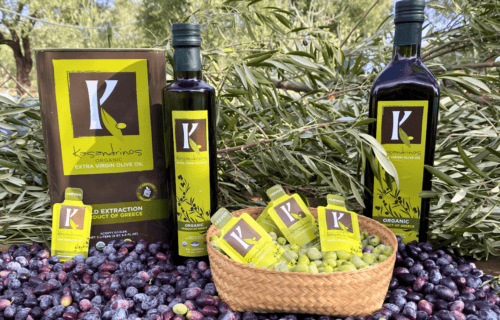
Leaky Gut and Histamine Intolerance or Mast Cell Activation Syndrome: Gut Support with Enzymes, Betaine HCL, and Short-Chain Fatty Acids (SCFAs)
If you’re struggling with Leaky Gut and Histamine Intolerance or Mast Cell Activation Syndrome, you’re not alone. The vast majority of people we work with have gut issues.
Like many of our clients, Beth’s gut was out of whack for years:
- Burping after meals
- Food sitting heavily in her stomach
- Feeling tired and brain fogged after eating
- Heartburn all the time
- Bloating
- Gut motility issues
- Stomach pain
After years of trial and error, she did manage to get her gut back into shape. Good digestive enzymes were one of the major things that made a difference.
Then something awful happened.
She was using a hydrogen water machine as part of a study.
The machine broke and sat for months with moisture inside it before the company arranged for repairs. It was sent off and returned with assurance that it had been fully sanitized and treated for bacteria and mold.
It hadn’t.
She drank the water for two days before she found out. And gut problems quickly surfaced – diarrhea, bloating, gas.
She lost her ability to tolerate FODMAPs. And had significant bacteria and Candida infections.
She had to work on repairing her gut…again.
But the things that worked in the past weren’t working this time around.
So, Beth reached out to Steven Wright, founder of Healthy Gut.
Sometimes, even when you know a lot, it helps to work with cutting edge experts. Steven is one of our favorite gut gurus and knows more about complex gut issues than any other practitioner we’ve met!
And he reminded Beth to go back to basics—to start with increasing digestive supports.
This approach started turning things around! And this approach has become the pillar of Mast Cell 360 gut support protocols.
In this post, we’ll go over:
- Why gut problems are so common with MCAS and Histamine Intolerance
- The Leaky Gut-histamine cycle and how to break it
- Why digestive enzymes, stomach acid, and SCFAs are our top picks
- How to choose the right supplements for your gut support
- Alternative options if you have Salicylate Intolerance or react to everything
It’s important you know that this blog post is for informational and educational purposes. It’s not meant to treat any health condition or to be prescriptive for anyone. If you have any medical condition, it is critical you work under the care and guidance of a licensed medical provider.
Why Digestive Problems Are Common with Mast Cell Activation Syndrome
In the clinic, we work with Mast Cell Activation Syndrome and Histamine Intolerance. And about 90% of the people we see have significant gut problems.
Three key factors that affect both mast cells and gut health are:
- Diamine oxidase enzymes (DAO enzymes) – This major enzyme that helps break down histamine is made in the gut. DAO levels and DAO activity go way down if there is gut inflammation. Low DAO can lead to Histamine Intolerance and activated mast cells.
- Inflammation – There are a huge number of mast cells in the gut. Gut inflammation means more mast cell activation. And mast cell activation means more histamine release (as well as hundreds of other inflammatory mast cell mediators.)
- Mold – 95%+ of people in the Mast Cell 360 clinic have Mold Toxicity. Mold toxins wreak havoc on the gut. This is because they get dumped into the gut to get eliminated.
Watch our Live on Mold & Gut Health for more information!
You can see that gut support is an important step.
In the Mast Cell 360 Clinic, gut support usually comes right after starting support for your nervous system and your mast cells. For most clients, it’s part of supporting your body while working on addressing the root causes behind MCAS and Histamine Intolerance.
And if you or a loved one is dealing with mast cell or histamine issues, gut problems are likely part of your health picture, too.
These often show up as chronic constipation and diarrhea. So, let’s start there.
Constipation and Diarrhea: Warning Signs Your Gut Needs Support
Constipation and diarrhea are frequent symptoms in Mast Cell Activation Syndrome (MCAS) and Histamine Intolerance.
Most people tend to have one or the other. However, you could switch back and forth between them.
This can be due to any number of things:
- Food intolerances and food sensitivities
- Gut microbiome imbalances (dysbiosis)
- IBS (Irritable Bowel Syndrome) / Inflammatory Bowel Disease
- Candida
- Mold Toxicity (mold toxins get dumped into the gut and wreak havoc)
- SIBO (small intestinal bacterial overgrowth)
- SIFO (small intestinal fungal overgrowth)
No matter what the cause, constipation and diarrhea tell you that your gut is crying out for help.
But chronic gut issues like this are often a sign of bigger problems.
Leaky Gut and Histamine Intolerance: The Hidden Connection Making Your Symptoms Worse
One of the most frequent underlying problems is Leaky Gut!
Think of your gut lining as a single layer of cells lined up, side by side, like tiles on a bathroom wall. With tight junctions (like grout) holding them together.
In a healthy gut, these tight junctions (spaces between gut cells) create a selective barrier that allows nutrients to pass through while keeping larger particles like toxins and bacteria out.
Leaky Gut (increased intestinal permeability) happens when your tight junctions become more open through damage and inflammation.
This allows larger food particles, toxins, and bacteria that wouldn’t normally get in to slip through your gut lining.
And it can create a cycle that makes Histamine Intolerance and MCAS worse:
- Undigested food particles, and other triggers, cross into your bloodstream
- Your immune system sees these as threats and creates inflammation
- Inflammation triggers mast cells to release histamine and other chemicals
- Excess histamine means more gut inflammation
- More gut inflammation makes the Leaky Gut worse
And this can keep you both more reactive AND reduce your ability to absorb nutrients (more on that later).
As you can see, it’s a cycle that needs to be interrupted.
If you’re dealing with this, and diet changes or other approaches haven’t helped enough, it may be time to consider extra gut supports like:
Let’s look at how each of these helps. We’ll start out by talking about digestive enzymes.
What Digestive Enzymes Are and How They Help Histamine Intolerance
Digestive enzymes are proteins in the body that speed up processes. Not just a little. A LOT. Anywhere from 100 million to 10 billion times.
When you have slow digestion, food can sit in your gut longer than it should. Providing food for bad gut bacteria to grow.
Digestive enzymes help your body break down food better and move food through your gut more regularly.
Digestive enzymes can be helpful when you have MCAS too because:
- Your entire digestive tract is packed with mast cells from end to end
- Much of your nervous system is located in your gut
Your nervous system and mast cells work hand in hand.
An upset gut = an upset nervous system and activated mast cells.
Better digestion = calmer gut inflammation.
Less gut inflammation = happier nervous system and calmer mast cells.
Digestive Enzymes Improve Nutrient Absorption in Histamine Intolerance
Digestive enzymes help in another crucial way.
They help you get more nutrition from what you eat.
We all know nutrients are essential for our bodies to function. When you are ill, you need a lot of nutrients to heal.
But when your gut is inflamed, you can’t absorb nutrients as easily.
This becomes even more of an issue if you have SIBO.
With SIBO, bacteria living in your small intestine where they shouldn’t compete with your body for nutrients, increasing the risk of deficiencies even when eating well.
Digestive enzymes improve your ability to break down food and absorb nutrients before bacteria can steal them.
Next, we’ll look at another of our top recommended digestive supports—the one that supports stomach acid.
Stomach Acid Support: How Betaine HCL Helps Histamine Intolerance
HCL stands for hydrochloric acid. It’s what is produced in your stomach as stomach acid.
Betaine HCL is basically a supplemental form of stomach acid.
And pepsin is a protease (breaks down protein) produced by the stomach.
They are usually found together in supplements because Betaine HCL is needed to activate pepsin. And pepsin digests protein.
A Betaine HCL supplement can help boost your stomach acid levels.
But why would you need to do that?
It turns out, a lot of people have low stomach acid.
- Steven Sandberg-Lewis (ND) has found that 75% of his patients who have acid reflux (GERD) also show low stomach acid.
- Jonathan Wright (MD) has found that 90% of the patients in his clinic have low stomach acid.
Having indigestion or acid reflux isn’t necessarily from having too much stomach acid. It’s more likely to be caused by too little stomach acid.
In one study, 31.5% of men and women over 60 (nearly 1 out of 3) suffered from low stomach acid.
If your stomach acid levels are low, you’re not going to break down proteins in foods very well.
And larger food molecules will get into the small intestine.
That’s not good.
As you just read, partially digested food particles in the small intestine can contribute to Small Intestinal Bacterial Overgrowth (SIBO). And inflammation in the gut.
Which can trigger mast cells and a release of histamine.
Betaine HCL has been shown in studies to restore stomach acid. That can greatly improve your ability to break down food.
Warning: Betaine HCL
Betain HCL is a strong acid. You don’t want it to come into direct contact with your skin, hands, or mouth.
DO NOT SPRINKLE IN FOOD OR WATER – If you need to start slow, wear gloves and empty part of the contents into an empty regular veggie capsule like this one:

And do not use Betaine HCL if you have an ulcer, h. pylori infection, or heartburn.
Next, let’s look at another of our top recommended digestive supports—short-chain fatty acids (SCFAs).
Short-Chain Fatty Acids (SCFAs) and Butyrate for Gut Healing
Short-chain fatty acids (SCFAs) are important in maintaining gut and immune health.
Different types include:
- Butyrate
- Acetate
- Propionate
- Pentanoic acid
- Hexanoic acid
Butyrate is the most important and most beneficial of the SCFAs. Most is produced in the colon (large intestine) and helps provide energy to 60-70% of the cells there.
Butyrate helps improve these parts of gut health:
- Support tight junctions (to heal and avoid Leaky Gut)
- Support mucus layers (to help avoid Leaky Gut)
- Increase good bacteria
- Get rid of pathogens
- Keep oxygen levels low in the colon (better for good bacteria)
SCFAs are important for MCAS and Histamine Intolerance because they help lower inflammation. And they help keep the gut healthy.
All of these things are important for healing your gut and getting your immune response back into balance.
If you don’t have enough butyrate, you may have trouble with these and also experience digestive problems like constipation or diarrhea.
So now you know why those top three digestive supports can help. But how do you choose the right support supplements?
Choosing the Best Gut Support Supplements for MCAS and Histamine Intolerance
With so many supplement options available, finding effective products that work when you’re sensitive can be challenging. Here are some key tips to help you select quality supplements that are more likely to work.
Digestive Enzyme Supplements
For Digestive Enzymes, look for:
- Full pH coverage (pH 1.7 to 11.0)
- Both pancreatic and brush border enzymes
- Activated with mineral cofactors (Enzymes are “activated” by cofactors. Basically, cofactors, usually vitamins and minerals, are helpers. They help get the enzymes energized to work.)
- Strong, concentrated enzymes
- Pharmaceutical grade status
- NSF certification (highest 3rd party standard in supplements)
- Systemic absorption (functioning as both digestive AND systemic enzymes)
- High quality raw ingredients
- Lack of additives like magnesium stearate, silica, artificial colors or flavors
- Avoidance of allergens like milk, casein, eggs, fish, shellfish, soy, wheat, gluten, tree nuts, peanuts, yeast, or rice
Betaine HCL Supplements
For Betaine HCL supplements, look for:
- At least 1 gram per serving
- Includes at least 15 mg pepsin per capsule
- High-quality raw ingredients
- Lack of additives like artificial colors or flavors
- Free of GMOs
Remember: Betaine HCL is a strong acid. Same safety warnings apply as mentioned above.
SCFA Supplements
For butyrate supplements, check for:
- Type of butyrate (you want tributyrin rather than butyrate salts)
- Delivery system that survives stomach acid (enteric capsule)
- Between 300 to 4,500 mg of butyrate a day
- Lack of additives
- Easy to use and low odor
- Free of GMOs
Other Supportive Gut Supplements: DGL, Ginger, and Intrinsic Factor
These three ingredients can make a big difference in the way supplements work in the gut.
DGL (Deglycyrrhizinated Licorice)
DGL is a form of the herb licorice. Licorice can raise blood pressure when taken over time. But DGL has the part that raises blood pressure removed.
And fortunately, the safer DGL form of licorice has a lot of gut and mast cell supporting properties.
For example, compounds in licorice (and the safer DGL extract) have been shown in research to support the lining of the GI tract by lowering inflammation-producing cytokines that trigger mast cells.
When looking for DGL supplements, look for:
- High quality raw ingredients
- Lack of additives like magnesium stearate, silica, artificial colors or flavors
- Free of GMOs
Ginger
Studies show ginger is a great mast cell stabilizer that can lower histamine levels and has H2 antihistamine properties.
For ginger supplements, look for:
- Organic, high quality raw ingredients
- Lack of additives
- Free of GMOs
Intrinsic Factor
Intrinsic factor is a protein that’s made in stomach cells that’s important for B12 absorption.
Gut inflammation can cause an intrinsic factor deficiency. Then you can’t absorb vitamin B12.
That’s why low B12 is so common with gut issues.
Supplementing with intrinsic factor can help get those B12 levels back up while the gut heals.
For intrinsic factor supplements, look for:
- At least 7.5 mg per capsule
- High quality raw ingredients
- Lack of additives like silica, and artificial colors or flavors
- Free of GMOs
We understand the frustration of trying multiple supplements without success. We’ve all had our ‘supplement graveyards’ over the years. That’s why we love sharing things we find that work for most of our sensitive community and deliver great benefits!
Top Gut Health Supplements for Leaky Gut and Histamine Intolerance or Mast Cell Activation Syndrome
Over time, in practice, we’ve put together what we call the Mast Cell 360 Functional Gut Lineup or ‘Holy Trinity of Gut Support’:
- HCL Guard+ – Stomach acid support
- HoloZyme™– Digestive enzymes
- Tributyrin-X™– Butyrate (SCFA) supplement
And here’s why we’ve found those products to be excellent digestive supports.
HCL Guard+

HCL Guard+ is the best HCL supplement we’ve found. It’s a holistic, professional grade stomach support. This formula goes beyond the traditional HCL supplement you’ll find. There’s actually nothing else like this on the market currently. Here’s why:
- Intrinsic factor (important for absorbing vitamin B12)
- Strong dose of pepsin, 3000 to 1 strength
- Powerful motility (gut flow) support
- DGL, a Chinese licorice that soothes the gut lining
- 550mg betaine HCL per capsule
- Free of fillers, flow agents, and other additives
- Non-GMO
- Free of gluten and major allergens
- Manufactured in USA
This supplement has been so helpful for many clients. But we want to tell you one more time:
This is an acid. You don’t want it to come into direct contact with your skin, neither your hands nor your mouth.
DO NOT SPRINKLE IN FOOD OR WATER – If you need to start slow, wear gloves and empty part of the contents into an empty regular veggie capsule like this one:

And do not use any Betaine HCL products if you have an ulcer, gastritis, stomach cancer, or against your health practitioners recommendations.
If you have Salicylate Intolerance or a lot of supplement sensitivities, this may not be the supplement for you. You might want to start with some of the other recommendations below.
HoloZyme™

HoloZyme™ contains the needed mineral cofactors to make the enzymes work properly.
There are no fillers in this. But it does have a little a little bit of magnesium citrate.
We normally say to avoid citrates. But in this, the citrates are used up by the activation process. So, we haven’t found it to be a problem very often.
There also isn’t anything else on the market like this product, because:
- Blend of both pancreatic and brush border enzymes
- The right amount of ideal mineral cofactors (470 mg per 2 servings)
- Activation blend precision tuned to dual 4x concentrated enzymes
- Pharmaceutical grade status with NSF certification
- High quality raw ingredients
- Lack of additives like magnesium stearate, silica, and artificial colors or flavors
- Avoidance of allergens like milk, casein, eggs, fish, shellfish, soy, wheat, gluten, tree nuts, peanuts, yeast, or rice
- Manufactured in USA
Rarely, a small number of clients have trouble with this one. Usually, it is because of significant nervous system dysregulation and sensitivities to every supplement. Or it is metal toxicity (minerals can displace metals).
Keep reading for some alternatives if you’re in either category.
Tributyrin-X™

The Tributyrin–X™ butyrate (SCFA) supplement is the latest technology. It’s easy to absorb and easy to take. Keep in mind that you don’t want to open this capsule, though!
Butyrate naturally tastes and smells very strong. So, it’s not one you usually want to start with just a drop. If you really need to open it, we suggest adding it to something like applesauce to mask the smell and flavor.
This supplement is:
- 99.9% pure liquid tributyrin
- Tributyrin, the most effective type of butyrate
- Enteric coated gel cap that survives stomach acid
- Non-GMO, gluten-free, lactose-free
- No fillers, stearates, silicon dioxide, or charcoal
- No smells or burps
- Easy to swallow gel caps
- A 30-day serving, providing up to 1,500mg per day
- Manufactured in USA
Related Post: The Best POST-biotic Butyrate for Mast Cell and Histamine Supports
These are some of the best digestive supplements we’ve seen. And they’ve been the only ones that really helped many people’s guts.
But there isn’t any single supplement that works for everyone with Mast Cell Activation Syndrome and Histamine Intolerance. Specifically, if you have Salicylate Intolerance you may not be able to take the HCL Guard+.
And if you are super sensitive to supplements, you may not be able to take combo formulas.
In that case, we have a different lineup of supplements we’ll share next.
Gut Support Options for Salicylate Intolerance and Highly Sensitive People
Most clients do really well with the Healthy Gut products. But if you are Salicylate Intolerant or super sensitive, you may want to check these out instead.
Gut Supports with Salicylate Intolerance
If you have Salicylate Intolerance, you might not do as well with the HCL Guard+.
That’s because the ginger and DGL are higher salicylate.
Consider this alternative line-up:
- Betaine HCL+Pepsin (No ginger or DGL)
- HoloZyme™
- Tributyrin-X™
Gut Supports for the Super Sensitive
Now, if you’re super sensitive and can’t do combo supplements, you can try a slightly different combination.
And remember to start just 1 new thing at a time and go slow!
Functional Gut Lineup for the super sensitive:
- Betaine HCL+Pepsin (simpler formula without the ginger, DGL, or intrinsic factor)
- Pancreatic Enzymes (simpler formula with fewer ingredients)
- Pure Encapsulations Liquid Butyrate (not as effective as the Tributyrin-X™ but may be an option if you can tolerate the lemon oil because you can open the bottle and start with one drop)
We just covered a lot of information! As you heal, you may need to go back over posts a few times, and that’s ok. As always, remember to take a deep breath and be gentle with yourself.
More Mast Cell Gut Health Resources
- DAO Supplements for Histamine Intolerance
- Low Histamine Diet
- Small Intestinal Bacterial Overgrowth (SIBO) — What to Know When You Have Mast Cell Activation Syndrome or Histamine Intolerance
- What to know about Candida when you have Mast Cell Activation Syndrome
- Histamine Lowering Probiotics for MCAS
Some links in this website are affiliate links, which means Mast Cell 360 may make a very small commission if you purchase through the link. It never costs you any more to purchase through the links, and we try to find the best deals we can. We only recommend products that we love and use personally or use in the Mast Cell 360 practice. Any commissions help support the newsletter, website, and ongoing research so Mast Cell 360 can continue to offer you free tips, recipes, and info. Thank you for your support!
References
Aly, A. M., Al-Alousi, L., & Salem, H. A. (2005). Licorice: a possible anti-inflammatory and anti-ulcer drug. AAPS PharmSciTech, 6(1), E74–E82. https://doi.org/10.1208/pt060113
Asl, M. N., & Hosseinzadeh, H. (2008). Review of pharmacological effects of Glycyrrhiza sp. and its bioactive compounds. Phytotherapy research : PTR, 22(6), 709–724. https://doi.org/10.1002/ptr.2362
Baker ME. (1994). Licorice and enzymes other than 11 beta-hydroxysteroid dehydrogenase: an evolutionary perspective. Steroids, 59(2):136-141.
Bekhit, A. A., Hopkins, D. L., Geesink, G., Bekhit, A. A., & Franks, P. (2014). Exogenous proteases for meat tenderization. Critical reviews in food science and nutrition, 54(8), 1012–1031. https://doi.org/10.1080/10408398.2011.623247
Brien, S., Lewith, G., Walker, A., Hicks, S. M., & Middleton, D. (2004). Bromelain as a Treatment for Osteoarthritis: a Review of Clinical Studies. Evidence-based complementary and alternative medicine : eCAM, 1(3), 251–257. https://doi.org/10.1093/ecam/neh035
Chen, Bing-Hung, et al. (2009). “Antiallergic potential on RBL-2H3 cells of some phenolic constituents of Zingiber Officinale (Ginger).” Journal of Natural Products 72(5), 950-953. Retrieved from: https://pubs.acs.org/doi/abs/10.1021/np800555y
Furusawa, J., Funakoshi-Tago, M., Mashino, T., Tago, K., Inoue, H., Sonoda, Y., & Kasahara, T. (2009). Glycyrrhiza inflata-derived chalcones, Licochalcone A, Licochalcone B and Licochalcone D, inhibit phosphorylation of NF-kappaB p65 in LPS signaling pathway. International immunopharmacology, 9(4), 499–507. https://doi.org/10.1016/j.intimp.2009.01.031
Ghalayani, P., Emami, H., Pakravan, F., & Nasr Isfahani, M. (2017). Comparison of triamcinolone acetonide mucoadhesive film with licorice mucoadhesive film on radiotherapy-induced oral mucositis: A randomized double-blinded clinical trial. Asia-Pacific journal of clinical oncology, 13(2), e48–e56. https://doi.org/10.1111/ajco.12295
Gurung, N., Ray, S., Bose, S., & Rai, V. (2013). A broader view: microbial enzymes and their relevance in industries, medicine, and beyond. BioMed research international, 2013, 329121. https://doi.org/10.1155/2013/329121
Isbrucker, R. A., & Burdock, G. A. (2006). Risk and safety assessment on the consumption of Licorice root (Glycyrrhiza sp.), its extract and powder as a food ingredient, with emphasis on the pharmacology and toxicology of glycyrrhizin. Regulatory toxicology and pharmacology : RTP, 46(3), 167–192. https://doi.org/10.1016/j.yrtph.2006.06.002
Jadhav, S. B., Shah, N., Rathi, A., Rathi, V., & Rathi, A. (2020). Serratiopeptidase: Insights into the therapeutic applications. Biotechnology reports (Amsterdam, Netherlands), 28, e00544. https://doi.org/10.1016/j.btre.2020.e00544
Krasinski, S. D., Russell, R. M., Samloff, I. M., Jacob, R. A., Dallal, G. E., McGandy, R. B., & Hartz, S. C. (1986). Fundic atrophic gastritis in an elderly population. Effect on hemoglobin and several serum nutritional indicators. Journal of the American Geriatrics Society, 34(11), 800–806. https://doi.org/10.1111/j.1532-5415.1986.tb03985.x
Larkworthy, W., & Holgate, P. F. (1975). Deglycyrrhizinized liquorice in the treatment of chronic duodenal ulcer. A retrospective endoscopic survey of 32 patients. The Practitioner, 215(1290), 787–792.
Mótyán, J. A., Tóth, F., & Tőzsér, J. (2013). Research applications of proteolytic enzymes in molecular biology. Biomolecules, 3(4), 923–942. https://doi.org/10.3390/biom3040923
Pesquet E. (2012). Plant proteases – from detection to function. Physiologia plantarum, 145(1), 1–4. https://doi.org/10.1111/j.1399-3054.2012.01614.x
Polzonetti, V., Natalini, P., Vincenzett, S., Vita, A., & Pucciarelli, S. ( 2010). Modulatory Effect of Oleuropein on Digestive Enzymes. In V. R. Preedy, V. R. & R. R. Watson. (Eds), Olives and olive oil in health and disease prevention. (pages 1327-1333). Academic Press. https://doi.org/10.1016/B978-0-12-374420-3.00148-0
Rees, W. D., Rhodes, J., Wright, J. E., Stamford, L. F., & Bennett, A. (1979). Effect of deglycyrrhizinated liquorice on gastric mucosal damage by aspirin. Scandinavian journal of gastroenterology, 14(5), 605–607. https://doi.org/10.3109/00365527909181397
Riccio, P., & Rossano, R. (2019). Undigested Food and Gut Microbiota May Cooperate in the Pathogenesis of Neuroinflammatory Diseases: A Matter of Barriers and a Proposal on the Origin of Organ Specificity. Nutrients, 11(11), 2714. https://doi.org/10.3390/nu11112714
Robinson P. K. (2015). Enzymes: principles and biotechnological applications. Essays in biochemistry, 59, 1–41. https://doi.org/10.1042/bse0590001
Sandberg-Lewis, S. (2017). Functional Gastroenterology: Assessing and Addressing the Causes of Functional Gastrointestinal Disorders. (2nd ed. edition). S. Sandberg-Lewis.
Sarker, S. A., Ahmed, T., & Brüssow, H. (2017). Hunger and microbiology: is a low gastric acid-induced bacterial overgrowth in the small intestine a contributor to malnutrition in developing countries?. Microbial biotechnology, 10(5), 1025–1030. https://doi.org/10.1111/1751-7915.12780
Sinclair, R. D., & Ryan, T. J. (1994). Proteolytic enzymes in wound healing: the role of enzymatic debridement. The Australasian journal of dermatology, 35(1), 35–41. https://doi.org/10.1111/j.1440-0960.1994.tb01799.x
Stockbruegger RW. Bacterial overgrowth as a consequence of reduced gastric acidity. Scand J Gastroenterol Suppl. 1985;111:7-16. doi: 10.3109/00365528509093749. PMID: 2861652.
Tan J, McKenzie C, Potamitis M, Thorburn AN, Mackay CR, Macia L. The role of short-chain fatty acids in health and disease. Adv Immunol. 2014;121:91-119. doi: 10.1016/B978-0-12-800100-4.00003-9. PMID: 24388214.
Urita, Y., Watanabe, T., Maeda, T., Arita, T., Sasaki, Y., Ishii, T., Yamamoto, T., Kugahara, A., Nakayama, A., Nanami, M., Domon, K., Ishihara, S., Kato, H., Hike, K., Hara, N., Watanabe, S., Nakanishi, K., Sugimoto, M., & Miki, K. (2008). Extensive atrophic gastritis increases intraduodenal hydrogen gas. Gastroenterology research and practice, 2008, 584929. https://doi.org/10.1155/2008/584929
Wright, J. & Lenard, L. (2001). Why Stomach Acid is Good For You: Natural Relief From Heartburn, Indigestion, Reflux, & GERD. M. Evans, publisher.
Yago, M. R., Frymoyer, A. R., Smelick, G. S., Frassetto, L. A., Budha, N. R., Dresser, M. J., Ware, J. A., & Benet, L. Z. (2013). Gastric reacidification with betaine HCl in healthy volunteers with rabeprazole-induced hypochlorhydria. Molecular pharmaceutics, 10(11), 4032–4037. https://doi.org/10.1021/mp4003738




Hello,
I have MCAS, extensive digestive issues, and a long history of reacting to various foods and supplements. I would like to try the suggested Biotics Research Betaine Plus HP. However, I cannot tolerate supplements that use beef/bovine gelatin capsules. Is there a vegan alternative without fillers that will support my MCAS?
Hi Sherry,
You can try opening up the supplement and using the vegan capsules:
https://www.amazon.com/dp/B07X81G9FC?tag=bethohara09-20&th=1
Best,
Zack
Thank you!
You’re welcome! 🙂